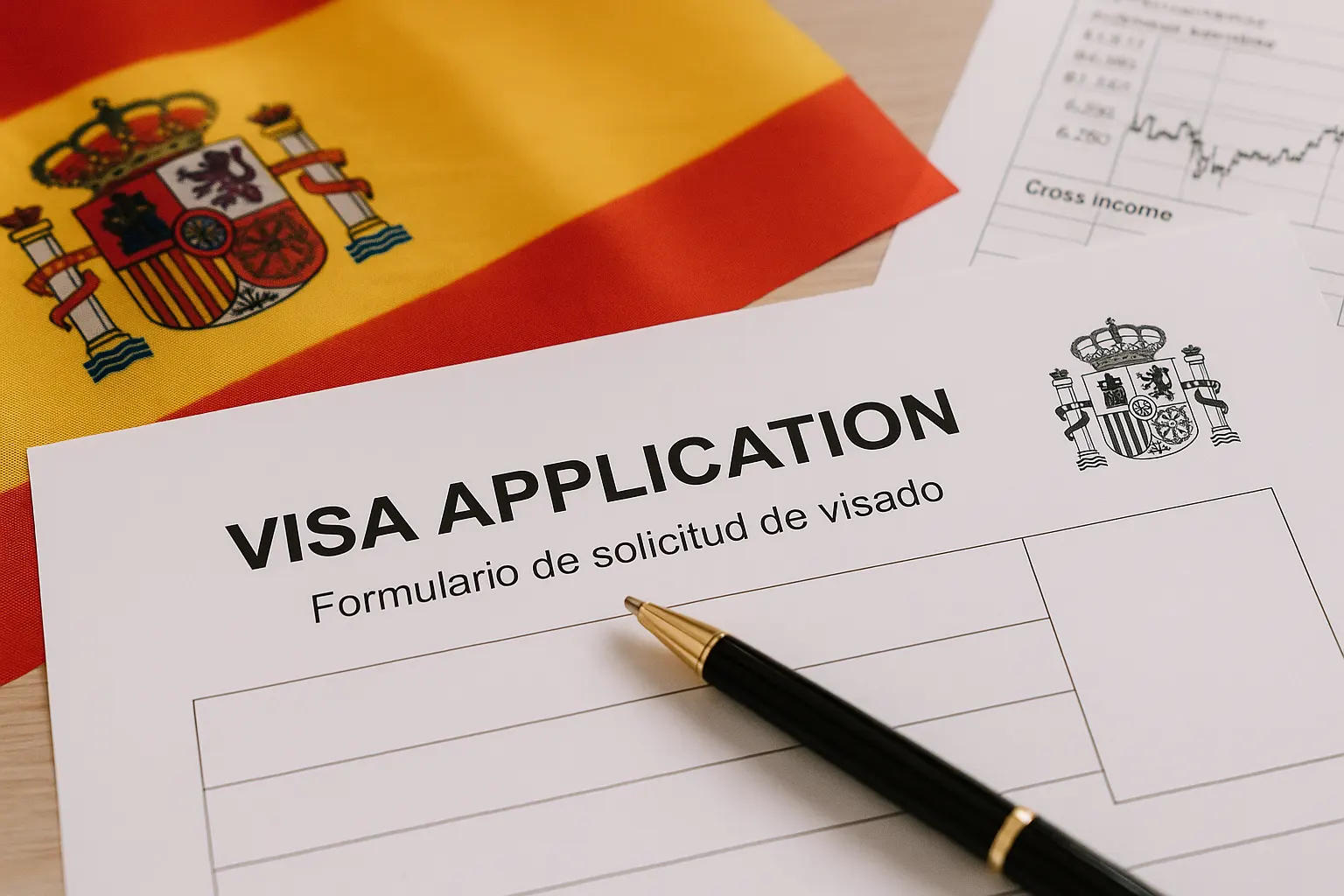Introduction
Opening a bank account in Spain can be a crucial step for expats and digital nomads. This article provides essential guidance for those looking to navigate the banking system in Spain, focusing on:
- Understanding the different types of accounts available, including resident and non-resident options.
- Required documentation such as your NIE number and proof of address.
- The step-by-step process of how to open a bank account in Spain, whether online or in-person.
Whether you need a digital nomad bank account, are searching for options to open a bank account in Spain from the UK, or prefer to use your passport to establish an account, this guide will equip you with the knowledge necessary for successful expat banking in Spain. If you’re a UK digital nomad, it’s worth exploring the tax implications under the Beckham Law which could save you money while living and working in Spain. Prepare to simplify your financial management while enjoying all that this vibrant country has to offer.
Understanding Bank Accounts in Spain
When opening a bank account in Spain, understanding the distinction between resident and non-resident accounts is crucial.
Resident Accounts
Eligibility
Available to individuals who have obtained residency status in Spain.
Benefits
- Generally lower fees for maintenance.
- Access to more comprehensive banking services, including loans and credit cards.
- Often includes local currency transactions without additional charges.
Drawbacks
Requires proof of residency, which may be challenging for new arrivals.
Non-Resident Accounts
Eligibility
Designed for foreigners who do not live permanently in Spain.
Benefits
- Easier to open with minimal documentation.
- Can be useful for those making frequent visits or business trips to Spain.
Drawbacks
Higher fees and less favorable interest rates compared to resident accounts. Limited access to services such as loans or mortgages.
Traditional Banks in Spain
Popular traditional banks like BBVA and Santander cater specifically to the needs of expats and digital nomads.
- BBVA: Offers a non-resident account, allowing easy money management for foreigners. They provide online banking services, multilingual support, and tailored advice for expats navigating financial landscapes.
- Santander: Known for its user-friendly interface, Santander provides various options designed for expats, including student accounts and special packages for freelancers.
Both banks focus on accessibility and convenience, ensuring that expatriates can manage their finances efficiently while living or traveling in Spain.
Exploring Digital Banking Options
Digital banking has become increasingly popular among expats and individuals on a digital nomad visa in Spain. Here are some reasons why online banks are a great choice:
- Convenience: Online banks allow users to manage their finances from anywhere with internet access, perfect for those who travel frequently.
- Lower Fees: Many online banks offer competitive fee structures, reducing costs associated with account maintenance and international transactions.
Popular Online Banking Options
N26
N26 is a German-based online bank that has expanded its services throughout Europe, including Spain. Key features include:
- No Maintenance Fees: Standard accounts come with zero monthly fees.
- Real-Time Notifications: Users receive instant alerts about transactions, enhancing financial awareness.
- ATM Withdrawals: Free withdrawals from ATMs across the Eurozone up to a certain limit.
Openbank
Openbank, a subsidiary of Banco Santander, provides tailored banking solutions for expats. Notable attributes include:
- No Annual Fees: Openbank offers accounts without any annual fees or minimum balance requirements.
- Comprehensive Services: Access to savings accounts, loans, and investment options within a single platform.
- User-Friendly Interface: Intuitive mobile app designed for easy navigation and management.
Revolut
Revolut stands out as an ideal option for digital nomads due to its unique offerings:
- Multi-Currency Accounts: Hold and exchange various currencies at interbank rates without hidden fees.
- Travel Perks: Benefits such as travel insurance and no foreign transaction fees enhance the experience of frequent travelers.
- Budgeting Tools: In-app budgeting features help users track spending across different currencies effectively.
The combination of these digital banking options allows expats and digital nomads to manage their finances efficiently while residing in Spain.
Documents Required to Open a Bank Account in Spain
To successfully open a bank account in Spain, specific documentation is essential. The requirements may vary depending on whether you are a resident or a non-resident, but key documents typically include:
- NIE Number: The Número de Identificación de Extranjero (NIE) is crucial for any foreigner living or working in Spain. This identification number serves as your tax identification in the country.
- Proof of Spanish Address: Banks require evidence of your local address. This can be shown through utility bills, rental agreements, or official correspondence.
- Proof of Income: Documentation demonstrating your income may be necessary, particularly for residents. This can include pay slips, bank statements, or tax returns.
For non-residents, banks often offer options such as a free Spanish bank account. However, having an NIE number and proof of a local address simplifies the process significantly.
Obtaining a Spanish address is vital not only for account opening but also for receiving important communications from the bank. Understanding these requirements facilitates the process of opening a bank account in Spain, ensuring that expats and digital nomads meet all necessary criteria to manage their finances effectively while living abroad.
The Step-by-Step Process of Opening a Bank Account in Spain
Opening a bank account in Spain can be done through two main methods: online application and in-person visits. This process is particularly important for those considering a digital nomad lifestyle, as having a local bank account can make financial transactions much easier while living abroad.
Online Application Process
- Select a Bank: Choose a bank that suits your needs, considering factors like fees and services offered to expats.
- Visit the Bank’s Website: Look for the section dedicated to account opening. Most banks provide a straightforward online form.
- Complete the Application: Fill out personal information and upload necessary documents, such as your NIE number and proof of address.
- Verify Identity: Some banks may require video identification or additional steps to confirm your identity.
In-Person Application Process
- Choose a Local Branch: Locate a branch of your chosen bank nearby.
- Prepare Documentation: Bring all required documents, ensuring they are complete and accurate.
- Fill Out Forms: At the bank, you will fill out an application form provided by the staff.
- Submit Your Application: Hand over your documentation to the bank representative for processing.
Approval Timeline
- The typical waiting period for account approval ranges from 1 to 5 days.
- Factors influencing this timeframe include:
- Completeness of submitted documentation
- Verification processes specific to each bank
- Any potential follow-up questions from the bank regarding your application
By understanding these steps, expats can navigate the banking process in Spain more efficiently, ensuring their financial needs are met promptly while living abroad.
Understanding Fees and Costs Associated with Spanish Bank Accounts
When opening a bank account in Spain, it is essential to understand the costs associated with maintaining the account. Key fees include:
1. Maintenance Fees
Most banks charge an annual maintenance fee, which typically hovers around €50. This fee may vary based on the type of account and the services included. Some banks offer accounts with no maintenance fees, especially for students or young adults.
2. International Transaction Fees
If you plan to make international transfers or use your card abroad, be aware of additional costs. These fees can range from 1% to 3% of the transaction amount. Banks may also impose fixed fees for sending money internationally, which could add up quickly if you frequently send funds overseas.
Understanding these fees enables expats and digital nomads to make informed decisions about their banking options. It is advisable to compare different banks and their offerings to find the most cost-effective solution tailored to individual needs. Engaging with customer service representatives during this evaluation can provide clarity on any specific fees associated with your chosen banking activities.
Benefits of Having a Local Bank Account as an Expat or Digital Nomad in Spain
Establishing a local bank account in Spain offers numerous advantages for expats and digital nomads. Accessing funds becomes significantly easier, facilitating seamless financial management while living abroad. Key benefits include:
1. Efficient Expense Management
A local account allows expats to manage expenses effectively. Payments for rent, utilities, and everyday purchases can be conducted in euros without the complication of currency exchange fees or fluctuating rates.
2. Simplified Travel Within Europe
With a Spanish bank account, withdrawing cash from ATMs across Europe is straightforward. This convenience eliminates the need for foreign transaction fees often charged by international banks.
3. Business Transactions for Freelancers and Entrepreneurs
For freelancers or entrepreneurs, having a local bank account simplifies business operations. Payment for services rendered can be received directly in euros, avoiding delays associated with international transfers.
4. Investment Opportunities
A local account opens doors to various investment options within Spain. Expats can easily manage investments in real estate or stocks without the challenges of currency conversion.
5. Better Financial Integration
Establishing a banking relationship in Spain enhances credibility among local clients and partners. This integration can lead to growth opportunities that are otherwise difficult to access as a non-resident.
For those considering remote work while living in Spain, it’s worth exploring the Spain digital nomad visa which provides additional flexibility for digital nomads. A digital nomad bank account serves as an essential tool in navigating daily life and business transactions in Spain, providing both flexibility and security while embracing new opportunities abroad.
Conclusion
Navigating the banking system in Spain can be straightforward for expats and digital nomads. Accessing financial support tailored to your needs is essential for a smooth transition into life in Spain. Consider the following options:
- Traditional Banks: Institutions like BBVA and Santander provide comprehensive services with local support.
- Online Banks: Services such as N26 and Openbank offer convenience and lower fees, ideal for tech-savvy individuals.
- Digital Nomad Accounts: Platforms like Revolut cater specifically to those traveling frequently across Europe.
Exploring various banking options empowers you to choose the best fit for your lifestyle. Establishing a local bank account not only simplifies your financial management but also enhances your overall experience while living or working in Spain. Take advantage of these resources to ensure a seamless integration into your new environment.















